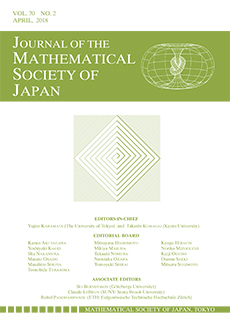Abstract
In this paper first we prove that if and are two permutable transcendental entire functions satisfying and , for some transcendental entire function , rational function and a function , which is analytic in the range of , then . Then as an application of this result, we show that if , where is a constant, a nonzero polynomial and a nonconstant polynomial, or , where are nonconstant polynomials, such that for a nonconstant entire function , then .
Citation
Liangwen LIAO. Chung-Chun YANG. "Julia sets of two permutable entire functions." J. Math. Soc. Japan 56 (1) 169 - 176, January, 2004. https://doi.org/10.2969/jmsj/1191418700
Information





